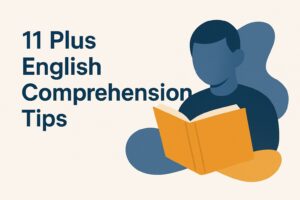
How to Build 11 Plus Problem-Solving Skills
Unlocking the secrets to acing the 11 Plus exams starts with mastering problem-solving skills. In fact, 11 Plus problem-solving skills are central to success, as they not only pave the way for higher scores but also foster critical thinking crucial for future learning.
We’ll explore the various types of problems you might encounter, effective strategies to sharpen your skills, and resources that can help you practise like a pro. Get ready to dive into a world of puzzles, tips, and techniques that will boost your confidence and performance!
Importance of Problem-Solving in 11 Plus Exams
Problem-solving skills represent a significant portion—up to 40%—of the 11 Plus exam, making them essential for achieving high scores and grasping complex concepts.
To enhance these abilities, students should participate in practice tests that closely resemble the exam format. Utilising resources such as Bond 11+ books or online platforms like Eleven Plus Exams can provide targeted practice that is beneficial.
Engaging in group study sessions allows students to collaboratively tackle challenging questions, fostering a sense of teamwork and encouraging diverse approaches to problem-solving. Those curious about when to begin their preparation might appreciate our insight on when to start preparing for the 11 Plus exam.
The real-life implications of strong performance are considerable; not only does it open doors to prestigious secondary schools, but it also cultivates confidence and critical thinking skills that are vital for future academic success.
Overview of the 11 Plus Exam Structure
The 11 Plus exam generally consists of four main sections: verbal reasoning, non-verbal reasoning, mathematics, and English. Each section is specifically designed to evaluate distinct skills.
Worth exploring: What Are the Subjects Covered in the 11 Plus Exam?
In the verbal reasoning section, the focus is on a student’s ability to understand and analyse written information. This part often includes tasks such as identifying synonyms and antonyms and answering comprehension passages.
The non-verbal reasoning section presents students with puzzles that involve shapes and patterns, which serve to assess their analytical thinking skills.
Mathematics encompasses key concepts such as arithmetic, geometry, and problem-solving. Questions may involve word problems and require timed calculations, challenging students to demonstrate their mathematical understanding.
Finally, the English section emphasises grammar, punctuation, and comprehension abilities. It includes passages followed by questions related to the text, allowing students to showcase their understanding of language mechanics.
This structured approach ensures a thorough assessment of each pupil’s cognitive abilities and their readiness for secondary education.
Understanding Problem-Solving Techniques
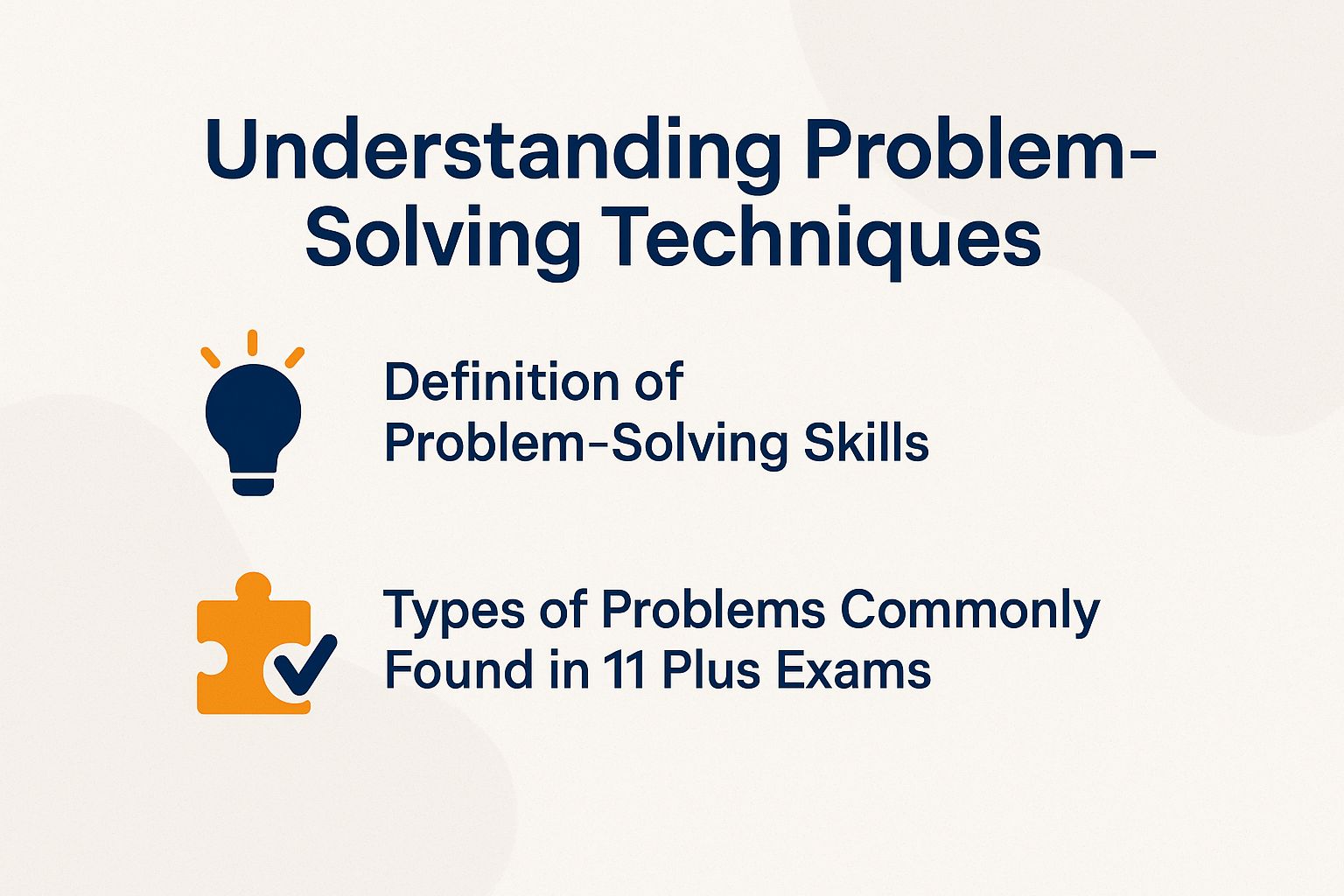
Mastering problem-solving techniques is crucial for achieving success in the 11 Plus exams. These skills equip students with the necessary tools to approach complex questions with confidence.
Definition of Problem-Solving Skills
Problem-solving skills encompass the ability to analyse a situation, identify challenges, and devise effective solutions, which is essential for successfully navigating the 11 Plus exam.
These skills can be broken down into several key components.
First and foremost, comprehension is crucial; students need to have a thorough understanding of the problem statement.
Next comes critical thinking, where they evaluate different approaches.
Utilising diagrams or charts to visualise relationships between numbers can be particularly helpful.
For example, when encountering a maths problem that requires logical reasoning, employing tools such as practice papers can prove advantageous.
Additionally, practising past exam papers allows students to refine their strategies and recognise patterns in questions.
This method effectively prepares them to address a variety of scenarios they might encounter during the exam.
Types of Problems Commonly Found in 11 Plus Exams
The 11 Plus exams encompass a variety of problem types, including mathematical word problems, logical sequences, and spatial reasoning tasks.
Mathematical word problems typically require students to interpret various scenarios and apply arithmetic operations, such as calculating the total cost of items or determining ages based on provided clues.
Logical sequences present candidates with the challenge of identifying patterns in sets of numbers or arrangements of letters, which tests their analytical skills.
Spatial reasoning tasks evaluate a student’s ability to visualise objects in three dimensions, a skill that is particularly important in subjects like geometry.
It is essential to familiarise students with these types of problems. Utilising resources such as past papers and online quizzes can effectively prepare them for the exam format and the expectations they will encounter.
Strategies for Developing Problem-Solving Skills
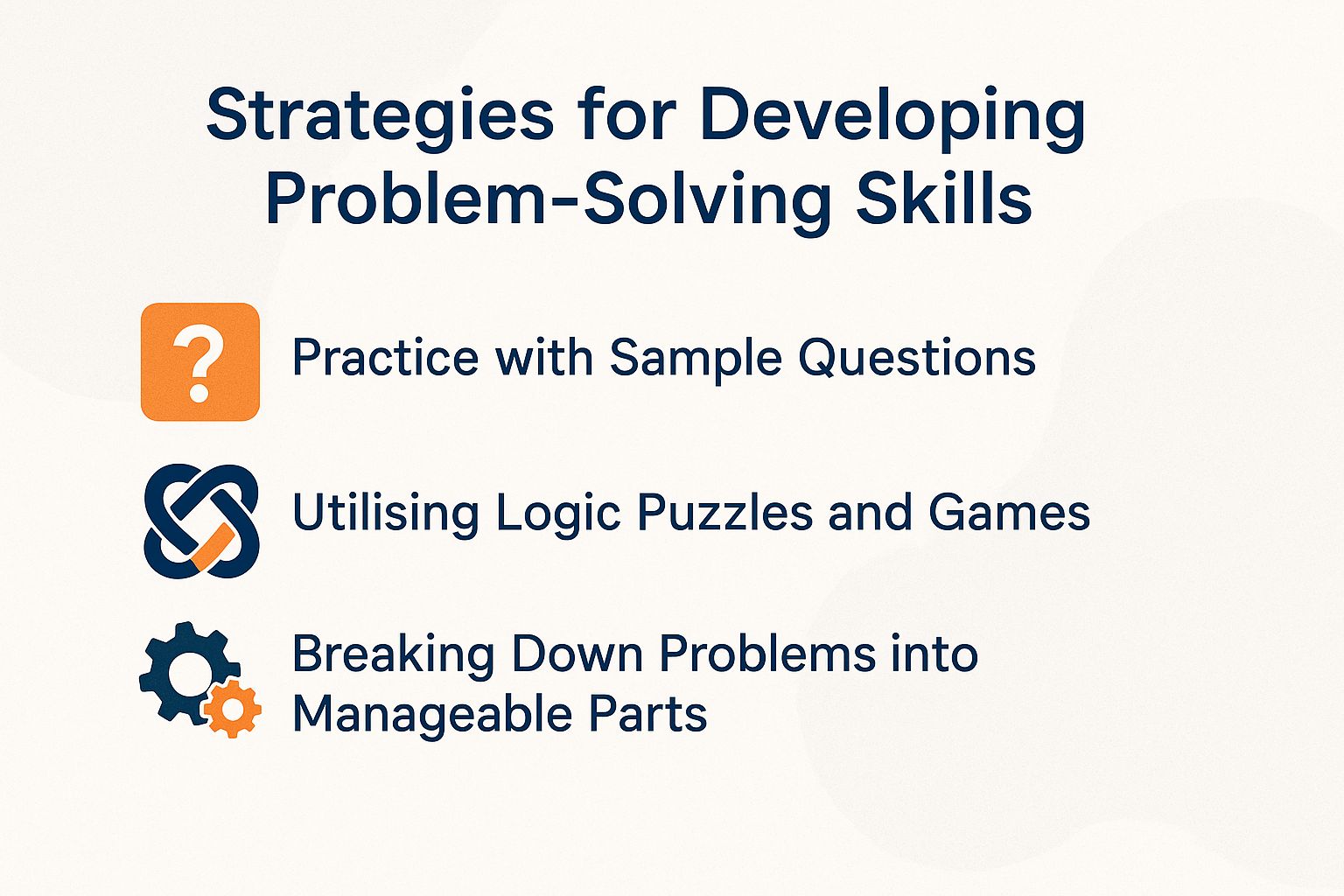
Implementing effective strategies to develop problem-solving skills can greatly influence a student’s performance in the 11 Plus examinations, ultimately resulting in higher success rates. For young learners, fostering a growth mindset proves crucial to building resilience and enhancing exam readiness.
Practice with Sample Questions
Regular practice with sample questions can help students become familiar with the exam format and question types, ultimately boosting their confidence and skill level.
To enhance their preparation, students should consider utilising resources such as Bond Assessment, which offers tailored practice questions, and the book ’11 Plus Practice Papers’ for comprehensive coverage.
Dedicating just 30 minutes each day to practice not only aids in effective time management but also allows students to recognise patterns in questions. Additionally, engaging with online platforms like Quizlet can provide interactive quizzes that reinforce their learning.
This structured approach ensures that students build familiarity with the material and reduce anxiety when it comes time to face the actual exam.
Utilising Logic Puzzles and Games
Incorporating logic puzzles and games into study routines can significantly enhance critical thinking and problem-solving skills in an enjoyable and engaging manner. Games such as Sudoku, Rush Hour, Logic Grid Puzzles, and Zuzu’s Zoo serve as excellent resources for students preparing for the 11 Plus exams.
Sudoku, for instance, involves placing numbers according to logical rules, which fosters strong deduction skills.
On the other hand, Rush Hour is a sliding block game that promotes strategic thinking as players navigate a grid to free a car.
Logic grid puzzles present challenges to players by requiring them to solve problems using given clues, thereby developing their analytical skills.
Meanwhile, Zuzu’s Zoo introduces younger students to fundamental logic and sequencing concepts.
By regularly practising these games, students can build confidence and enhance the reasoning abilities that are essential for success in their exams.
Breaking Down Problems into Manageable Parts
Teaching students how to break down complex problems into smaller, manageable parts can significantly simplify their approach and enhance their accuracy in solving these issues.
It is beneficial to encourage students to begin by identifying the main components of the problem. For example, when they encounter a maths problem, they can express it in terms of equations or steps to clarify their thought process.
Next, guiding them to isolate each part is crucial—this involves separating the necessary data from the operations they need to perform. Utilising tools like mind maps or flowcharts can help visualise these steps effectively.
By practising with various problems, such as word maths problems or science experiments, students can refine their skills in systematically tackling challenges. This practice ultimately fosters both their confidence and competence in problem-solving.
Effective Study Techniques
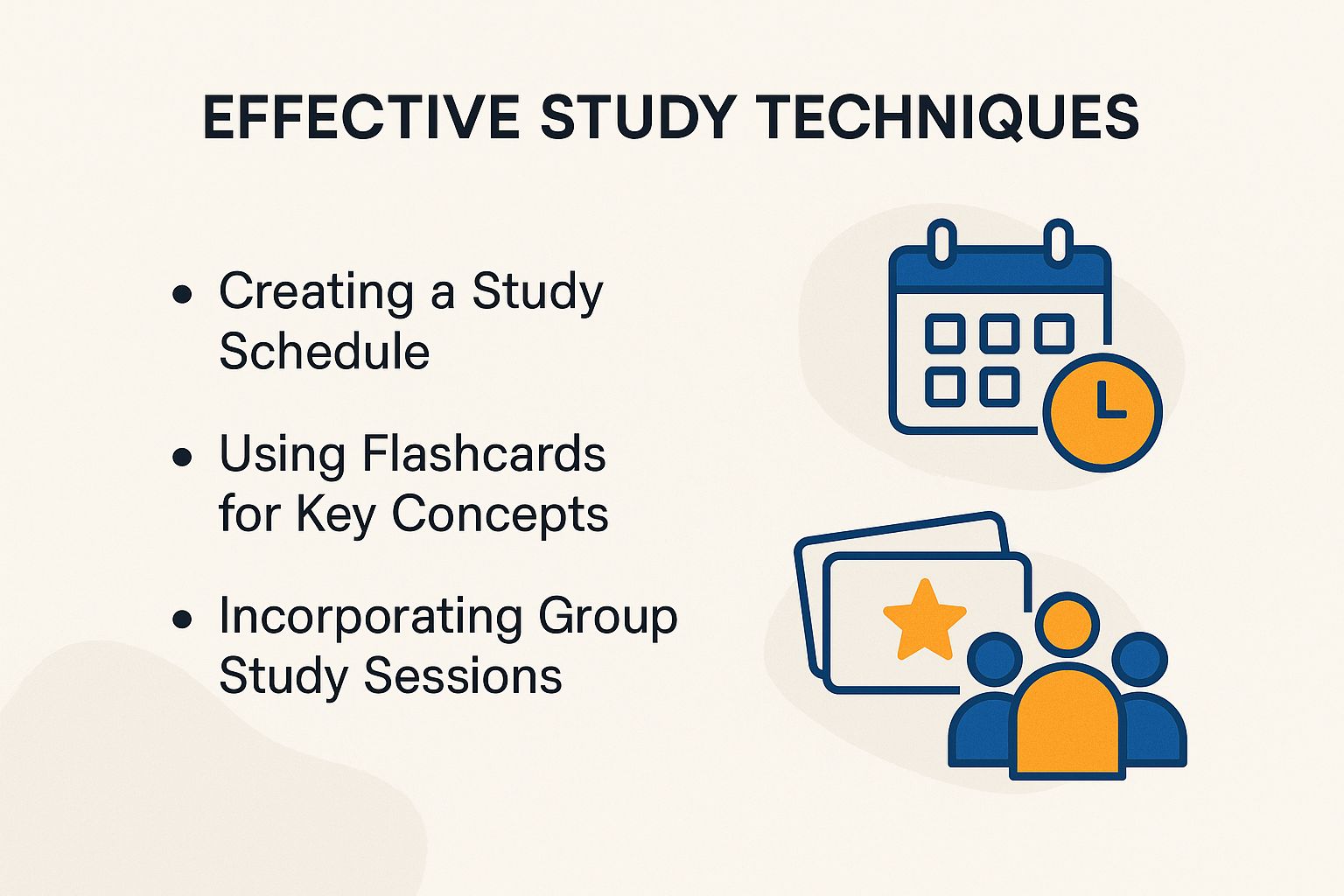
Adopting effective study techniques is essential for mastering problem-solving skills and ensuring successful preparation for the 11 Plus exams.
It is important to approach your studies with strategies that promote understanding and retention, as this will greatly enhance your performance in the exams.
Creating a Study Schedule
A structured study timetable can be highly beneficial for students, as it allows them to allocate their time effectively, balancing various subjects and problem types in preparation for the 11 Plus examinations.
To begin, consider dividing your week into focused study sessions, aiming for one-hour blocks. For example, you might allocate Monday and Wednesday evenings to mathematics practice while reserving Tuesdays and Thursdays for English.
Saturdays could serve as an ideal time for reviewing past papers or honing comprehension skills, where dedicating 2 to 3 hours would be advantageous.
Striving to study at least five days a week will help ensure that a variety of subjects are covered.
It is also important to incorporate short breaks into your study routine to maximise retention. Feel free to adjust your timetable as necessary to accommodate your personal strengths and areas that may require additional attention.
Using Flashcards for Key Concepts
Using flashcards as a study tool can significantly reinforce key concepts and enhance memory retention, making them particularly effective for reviewing problem-solving strategies.
To create effective flashcards, it is essential to begin by identifying the key concepts and formulas within your study materials. Consider utilising apps like Quizlet to create and organise your flashcards digitally. This approach allows you to incorporate images, audio, or even diagrams, thus enriching your learning experience.
Establishing a routine for reviewing these flashcards regularly is also crucial—ideally employing the spaced repetition technique, which recommends reviewing material just before the point at which you might forget it. By doing so, you will reinforce your memory efficiently, ultimately making your study sessions more productive.
Incorporating Group Study Sessions
Group study sessions can offer valuable collaborative learning experiences, enabling students to share problem-solving strategies and insights specifically for the 11 Plus exams.
To organise a productive group study session, it is advisable to keep the group size to around 4-6 students. This size allows for active participation from everyone involved. It is beneficial to select specific topics for discussion, such as mathematics problem-solving techniques or comprehension exercises.
To maintain high levels of engagement, consider rotating roles among group members—such as facilitator, timekeeper, and note-taker—so that everyone has a chance to contribute. Tools like Quizlet can be utilised for creating interactive flashcards, while platforms such as Zoom can facilitate online meetings.
Additionally, incorporating regular breaks will help maintain focus and energy, ensuring that the sessions remain both productive and enjoyable.
Resources for Practice
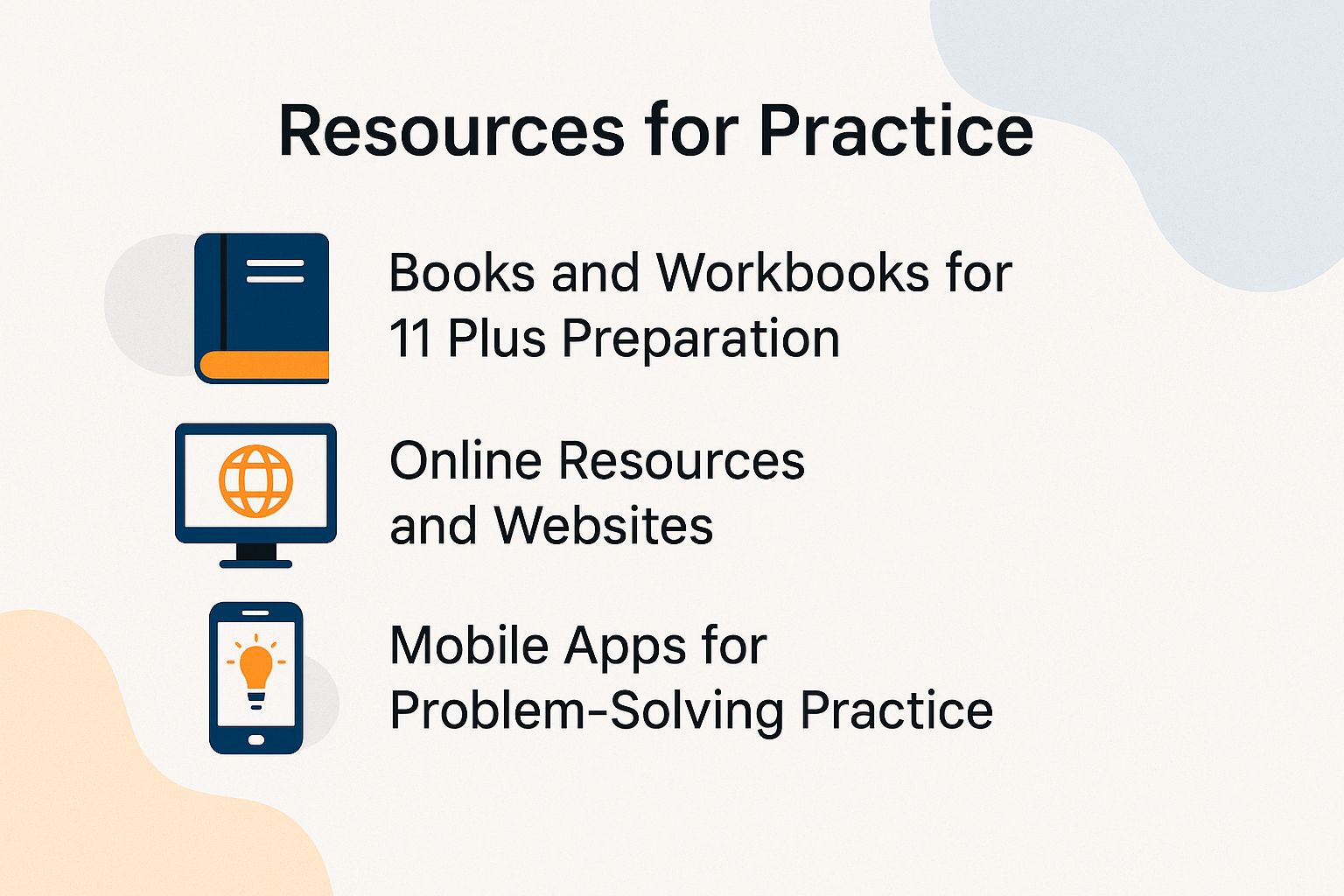
Utilising a range of resources for practice can significantly enhance a student’s preparedness and confidence as they approach the 11 Plus exams.
Books and Workbooks for 11 Plus Preparation
Books such as The Bond 11+ Maths and Non-Verbal Reasoning and 11 Plus Success workbooks offer structured guidance and practice to assist with exam preparation.
For a comprehensive approach to 11 Plus preparation, consider the following recommended resources:
CGP 11 Plus Maths and English provides clear explanations and practice questions, making it an excellent choice for developing foundational skills.
Letts 11 Plus Revision Practice Papers includes a range of exam-style questions, which are ideal for enhancing time management and examination techniques.
Schofield & Sims 11+ English specifically targets English comprehension and grammar, both of which are essential for the verbal reasoning component.
Using these specialised workbooks will help build confidence and knowledge across all relevant subjects effectively.
Online Resources and Websites
Websites such as CGP and 11 Plus Mock Exams present an extensive array of online resources, including practice tests and interactive exercises specifically designed for students preparing for the 11 Plus exam.
Additionally, platforms like Barnardo’s offer free revision aids, while The Student Room serves as a valuable space for students to exchange insights and resources.
For those seeking personalised support, online tutors from platforms like tutor.com can provide targeted guidance, helping students concentrate on their weaker areas.
For a more engaging learning experience, one might consider using Kahoot, which enables educators to create enjoyable quizzes. Incorporating these tools into a study routine can significantly improve learning outcomes.
Related insight: the format of the 11 Plus exam can also influence how students should prepare and utilise these resources effectively.
It is advisable to schedule regular practice sessions with mock exams for focused preparation and to actively engage with peers on forums for a collaborative approach to learning.
Mobile Apps for Problem-Solving Practice
Mobile applications like 11 Plus Revision and Maths App offer convenient problem-solving practice, allowing for more flexible and accessible study sessions.
Apps such as Kahoot! and Quizlet enhance user engagement through interactive quizzes and flashcards, respectively. Kahoot! transforms learning into a competitive and enjoyable experience, with a free version available that facilitates real-time participation. On the other hand, Quizlet provides a free basic plan that is particularly effective for memorising concepts through spaced repetition.
For targeted maths practice, Photomath allows users to scan equations with their camera, instantly delivering detailed solutions and explanations.
By selecting a combination of these tools, individuals can address various learning styles, ultimately enhancing retention and understanding.
Monitoring Progress
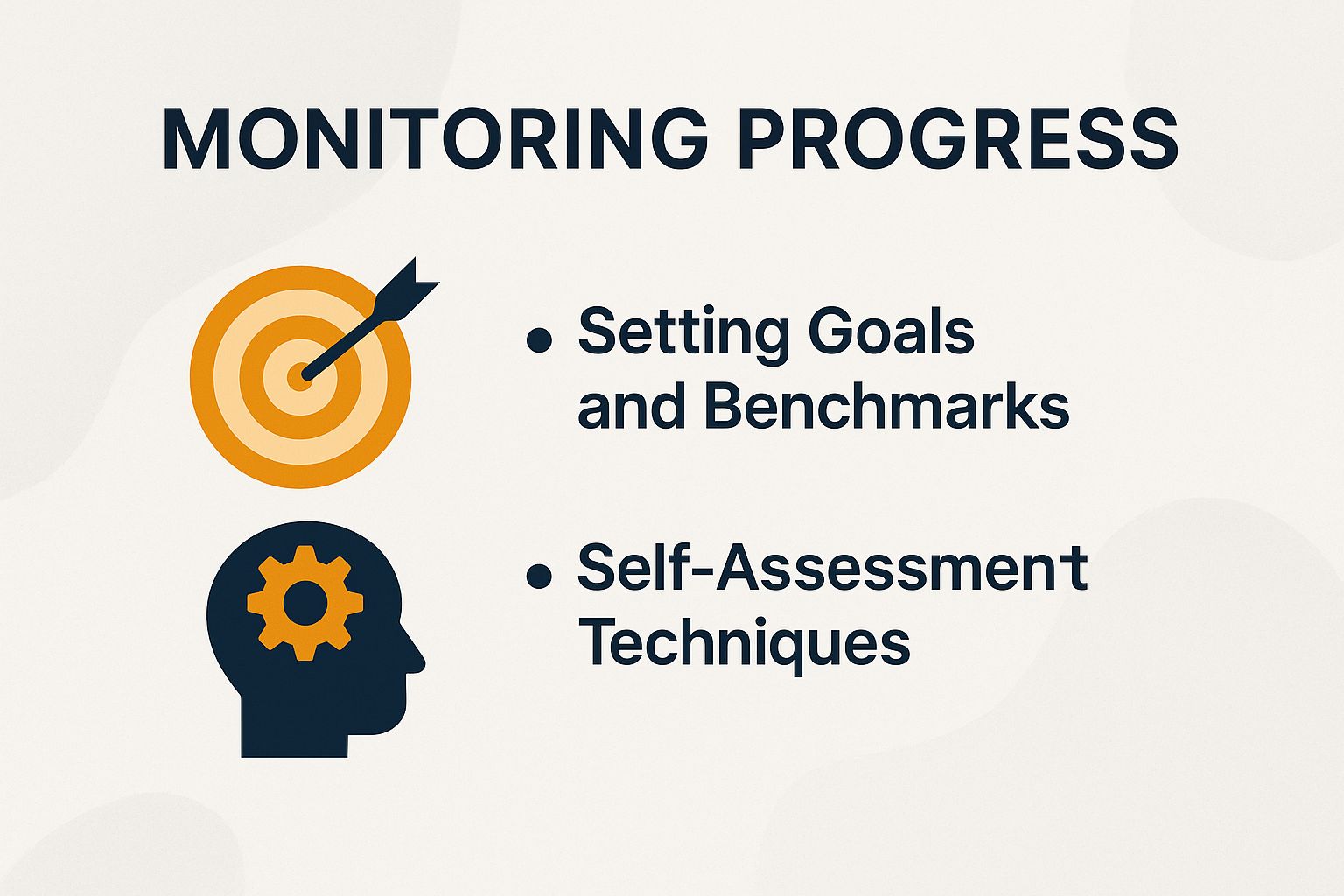
Monitoring progress is crucial for students, as it allows them to evaluate their readiness for the 11 Plus exam and make any necessary adjustments to their study strategies.
By keeping track of their performance, they can identify areas that need improvement and refine their approach to ensure they are adequately prepared.
Setting Goals and Benchmarks
Setting measurable goals and benchmarks is an effective way for students to monitor their improvement in problem-solving skills, allowing them to focus their study efforts more efficiently.
To create SMART goals, one should begin by defining specific objectives, such as aiming to improve maths test scores by 15% over the semester. This goal can be made measurable by tracking weekly quiz results. It is also important to ensure that the goal is achievable; for example, if a student currently scores 70%, a 15% improvement would be realistic.
Furthermore, the goal should be relevant to their overall learning objectives, aligning with long-term aspirations such as university readiness. Establishing a timeline, such as achieving this goal by the end of the academic year, is also crucial.
Regularly reviewing progress each month can encourage necessary adjustments and help maintain motivation.
Self-Assessment Techniques
Implementing self-assessment techniques, such as practice tests and reflective journaling, can significantly assist students in recognising their strengths and weaknesses in problem-solving skills.
To enhance their self-assessment, students may find specific tools like Quizlet particularly useful for creating customised flashcards and quizzes relevant to their subjects. It is advisable for them to regularly track their scores, allowing for effective monitoring of their improvement over time.
Additionally, maintaining a learning journal proves to be an effective strategy. In this journal, students can reflect on the problem-solving approaches they utilised during practice tests and document which strategies yielded successful outcomes.
Setting aside time each week to review both their scores and journal entries can help solidify their learning and identify patterns in their strengths, as well as areas that require further development.
Common Challenges and Solutions
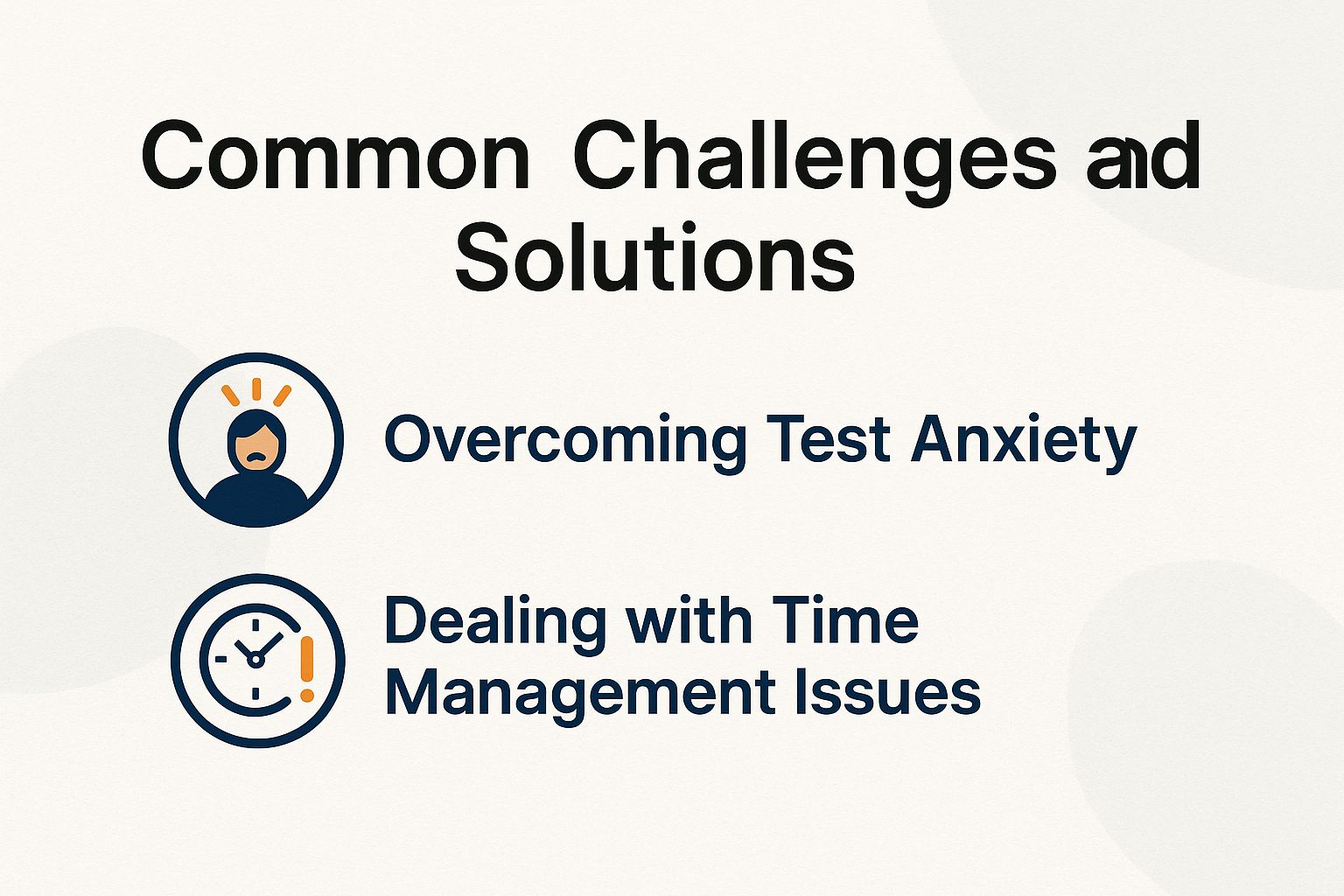
Students preparing for the 11 Plus exams frequently encounter common challenges that, if not addressed with effective solutions, can hinder their performance.
It is important to recognise these challenges and implement strategies to overcome them for the best possible outcomes.
Overcoming Test Anxiety
Implementing specific coping strategies can greatly assist students in managing test anxiety, ultimately improving their focus and performance during the 11 Plus exams.
One effective approach is the practice of deep breathing exercises. By inhaling deeply for a count of four, holding for another four, and then exhaling for four, students can repeat this cycle to help calm their nerves.
Visualisation techniques can also be beneficial; by imagining a calm testing environment and picturing successful outcomes, students can instil a sense of confidence within themselves.
Additionally, engaging in mock exams under timed conditions allows students to become familiar with the test format, which can help reduce surprises on the actual exam day.
By combining these techniques, students can significantly enhance their emotional resilience leading up to their exams.
Dealing with Time Management Issues
Time management challenges can significantly affect performance in the 11 Plus exams, but with the right strategies, students can learn to manage their time effectively.
To improve time management for the 11 Plus exams, students should practise with timed tests to become accustomed to the pace required for answering questions. By understanding the structure and requirements of the 11 Plus exams, they can better tailor their preparation strategies.
Prioritising questions can be essential; by addressing easier questions first, students can build their confidence and secure points early in the exam.
Incorporating a timer during study sessions can help foster a sense of urgency, simulating exam conditions and helping to alleviate anxiety. Additionally, breaking study material into manageable sections enables focused review without the risk of feeling overwhelmed, ensuring that students cover the entire syllabus comprehensively over time.
Frequently Asked Questions: 11 Plus Problem-Solving Skills
How can I improve my problem-solving skills for the 11 Plus exam?
There are several ways to build your problem-solving skills for the 11 Plus exam. One effective method is to practise solving a variety of problems from past papers or workbooks. You can also try solving puzzles and brain teasers to strengthen your critical thinking abilities. Another helpful tip is to break down larger problems into smaller, more manageable parts to make them easier to solve.
What strategies can I use to solve problems faster during the 11 Plus exam?
One strategy is to read the question carefully and make sure you understand what is being asked before attempting to solve it. Another useful technique is to use logic and deductive reasoning to eliminate incorrect answer choices and narrow down your options. Time management is also crucial – make sure to allocate enough time for each question and move on if you get stuck.
How do I develop my critical thinking skills for the 11 Plus exam?
Critical thinking is an essential component of problem-solving. To develop this skill, you can try solving puzzles, riddles, and brain teasers that require you to think outside the box. You can also practise breaking down complex problems into simpler components and analysing information from different perspectives.
Are there any resources available to help me build my problem-solving skills for the 11 Plus exam?
Yes, there are several resources available, such as past papers, workbooks, and online practice tests. These materials provide a variety of questions that will help you familiarise yourself with the types of problems you may encounter in the exam. Additionally, there are many websites and books that offer tips and strategies specifically tailored for the 11 Plus exam.
Can practising problem-solving skills in subjects other than maths help for the 11 Plus exam?
Yes, practising problem-solving skills in other subjects, such as English, can also improve your overall problem-solving abilities. Many questions in the 11 Plus exam will require critical thinking and logical reasoning, which are skills that can be developed through various subjects. It is essential to practise a range of subjects to improve your overall problem-solving skills.
How can I stay calm and focused during the 11 Plus exam to apply my problem-solving skills effectively?
To stay calm and focused during the exam, it is crucial to be well-rested and well-prepared. Make sure to get a good night’s sleep before the exam and have a nutritious breakfast. During the test, take deep breaths, and if you feel stuck on a particular question, move on and come back to it later. Remember to read each question carefully and use your problem-solving strategies to solve them logically and efficiently.


